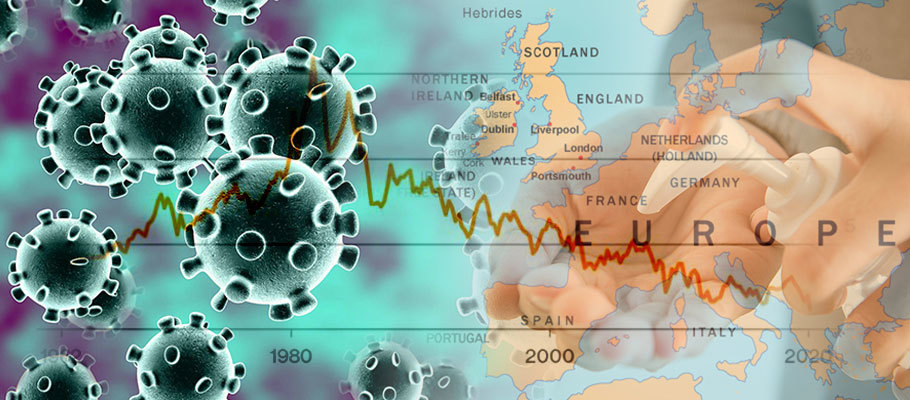
Published: March 16th, 2020
– Thursday, March 12, was the worst day in history for European stocks as all of them tanked following mounting fears of the imminent economic meltdown that will result from the spread of the coronavirus pandemic. Investors, it seems, are not convinced that the actions of the European Central Bank to cushion the economies of the European countries from the blow is adequate.
Europe’s Stoxx 600 plunged a whopping 11% on Thursday, March 12 in what is likely the worst day for European stocks. CAC of France and Germany’s DAX were also down 12%. The drop is associated with fears that mount every day over the impending effects of the novel coronavirus.
The market sentiments send out the vibe that the European governments and the European Central Bank (ECB) have not put in place adequate measures to cushion the economies from the pandemic. Investors, as such, are not impressed and are liquidating their positions on equities.
ECB announced that it would bolster bond purchases. The bank is joining policymakers and other institutions around the globe to fashion measures that will contain the effects of coronavirus. Markets, however, think that strengthening bond purchases and taking steps to improve liquidity does not do enough to support the European economy. Investors had hoped that the ECB would push the interest rates far into the negative territory.
The ECB’s defiant stand sent the stocks on a freefall. Considering that the said stocks had earlier suffered from President Trump’s stance to ban travel from a handful of European countries, the effect of the decision was devastating.
The interest rates in Europe are at historical lows already and economists had voiced their fears that a further trim may not help cushion the block from an economic shock.
The proposals that the ECB fronted included a generous lending retinue to banks to make loans available to small businesses. It also promised to buy €120 billion (approx. $135billion) worth of additional bonds in 2020. This amount will supplement the bank’s €20 billion (approx. $23 billion) it spends monthly on existing purchases.
The announcement which the ECB made in a scheduled meeting in Germany follows the moves of the Bank of England (BoE) and the Federal Reserve to cut rates by half a percent during the two banks’ emergency sessions. Both the Federal Reserve and BoE cited the effects of the coronavirus pandemic on the economies of the U.S. and the UK as the reason for clipping the rates.
The moves by three central banks have not done much to placate the nerves of the frightened investors. As evidenced in the markets, nerves rage and investors keep dumping risky assets as panic heightens.
The sad turn of fate has chanced upon Europe during a period of considerably low rates of interest characterized by heightened bond buying. Economists think that if the viral attack continues spreading, the central banks run out of adequate preventive measures to salvage the global economy.
The worsening state of the global economy may push policymakers to advocate for individual governments to increase their spending.
In a bid to save the European stocks, the ECB President Christine Largade, who has been on the job for just four weeks is urging European governments to adopt fiscal responses that are both ambitious and coordinated. Largade says that the institutions that should be at the forefront in enforcing these policies are the fiscal authorities and the institutions in Europe that harness fiscal authorities.
While responding to the nudge, Italy, which also is the worst affected country with the virus outside China has directed €25 billion (Approx. $28 billion) towards eradicating the virus. Angela Merkel has also said that Germany will take action though she fell short of specifying the value or level of investment.
Markets have slumped intensely since the spread of the coronavirus extended outside the Chinese borders. The talk that the global economy will collapse and Europe will soon slide in depression is now too real to wish away.
Real as this statement may sound, it is starkly different from the picture that the EU painted just a few weeks ago. In an economic forecast released on February 13, the union noted that the factory production among its 19 member countries had grown briskly in January. The forecast went on to say that the year will be solid with the economy returning moderate and steady growth.
The report also mentioned the risks associated with a viral outbreak but concluded by noting that the disease will have limited global spillover despite peaking in Q1 of the year.
Fast-forward to about 30 days later and the continent is slowly but surely sliding into depression. The markets have taken some bruising beatings, investors are at the peak of their panic levels, and shops restaurants, and bars remain closed across the continent. Hairdressers, theatres, and cinemas are closed and football matches across several domestic leagues have been canceled.
Sadly, the tax cuts and several other stimulus packages that the ECB has put forth seem inadequate in and are imperfect measures for rectifying the blows that the coronavirus has meted on the European economy.
The disease has depressed demand and altered the lifestyle of most people as they know it, sending them hunkering down as they come to terms with their drastically restricted movements.
Even the ECB was quick to admit that even though the stimulus package they have proposed is substantial, it may not be enough to change the market sentiments.
The European stocks last week took a beating that is only comparable to the events of Black Friday. And, while the ECB is doing everything to contain the slide, it is becoming apparent that the bank does not have enough ammunition to deal with the impacts of coronavirus should the spread continue. That, notwithstanding, policymakers and authorities all over are hoping that the nerves of the market will cool down if just for a bit.